

Top 15 Calcium-Rich Foods (Many Are Non-Dairy) Calcium is very important for your health.
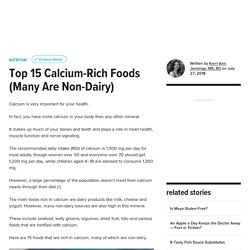
In fact, you have more calcium in your body than any other mineral. It makes up much of your bones and teeth and plays a role in heart health, muscle function and nerve signaling. The recommended daily intake (RDI) of calcium is 1,000 mg per day for most adults, though women over 50 and everyone over 70 should get 1,200 mg per day, while children aged 4–18 are advised to consume 1,300 mg. However, a large percentage of the population doesn’t meet their calcium needs through their diet (). The main foods rich in calcium are dairy products like milk, cheese and yogurt. Is There a Supplement That Helps Depression? Study Reveals One Is Best. Omega 3 fatty acids, also commonly found in fish, vegetable oil, and nuts.
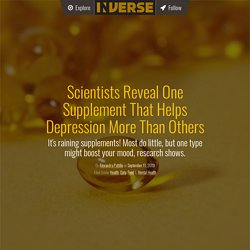
Across the research, evidence showed omega-3s reduced symptoms of depression beyond the effects of antidepressants alone. While previous research suggests that no dietary supplement, including omega-3s, helped prevent depression, this review shows omega-3s could help treat it. The world’s largest review of quantitative studies on dietary supplements and mental health— called a meta-synthesis — was published this week in World Psychiatry. It examined 33 meta-analyses of randomized control trials (RCTs), the gold standard of quality research. Supplements for Depression: What Works, What Doesn’t. Antidepressant foods: An evidence-based nutrient profiling system for depression.
The antioxidant paradox: less paradoxical now? - Halliwell - 2013 - British Journal of Clinical Pharmacology - Wiley Online Library. More harm than good? Antioxidants defend cancer in body. By ANDY COGHLAN They may be marketed as a way to protect yourself against disease, but antioxidant supplements are increasingly thought of as more foe than friend.
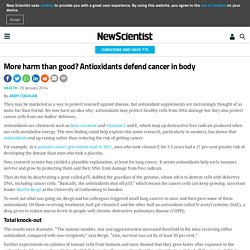
We now have an idea why: antioxidants may protect healthy cells from DNA damage but they also protect cancer cells from our bodies’ defences. Antioxidants are chemicals such as beta-carotene and vitamins C and E, which mop up destructive free radicals produced when our cells metabolise energy. The new finding could help explain why some research, particularly in smokers, has shown that antioxidants end up raising rather than reducing the risk of getting cancer. For example, in a prostate cancer prevention trial in 2011, men who took vitamin E for 5.5 years had a 17 per cent greater risk of developing the disease than men who took a placebo.
Supplements for Depression: What Works, What Doesn’t. Antidepressant foods: An evidence-based nutrient profiling system for depression. Magnesium. Introduction. Most common nutritional deficiencies: Iron, copper, calcium, among top. Many nutrients are important for good overall health.
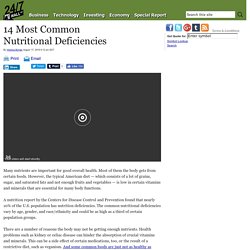
Most of them the body gets from certain foods. However, the typical American diet — which consists of a lot of grains, sugar, and saturated fats and not enough fruits and vegetables — is low in certain vitamins and minerals that are essential for many body functions. A nutrition report by the Centers for Disease Control and Prevention found that nearly 10% of the U.S. population has nutrition deficiencies. The common nutritional deficiencies vary by age, gender, and race/ethnicity and could be as high as a third of certain population groups. There are a number of reasons the body may not be getting enough nutrients. While a consistently healthy diet is usually enough to supply the body with the nutrients it needs to function at its best, some people may need a higher amount of certain vitamins for body development and the prevention of diseases, depending on age and overall health.
Most vitamins may be a waste of money, but study finds two exceptions. The majority of vitamins and other nutritional supplements don’t increase lifespan or protect one’s heart health, a huge analysis out of Johns Hopkins University has found.
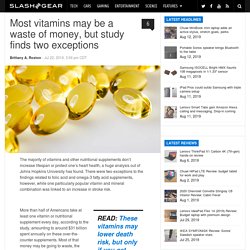
There were two exceptions to the findings related to folic acid and omega-3 fatty acid supplements, however, while one particularly popular vitamin and mineral combination was linked to an increase in stroke risk. READ: These vitamins may lower death risk, but only if you get them from food More than half of Americans take at least one vitamin or nutritional supplement every day, according to the study, amounting to around $31 billion spent annually on these over-the-counter supplements. Most of that money may be going to waste, the researchers concluded after conducting a ‘massive’ analysis of 277 existing clinical trials. The good news is that taking most of these supplements weren’t linked to any sort of health harm. There were two potential exceptions to the findings: folic acid and omega-3 fatty acid supplements.
What is vitamin B12 and what are the symptoms of a deficiency? 5 Reasons Why Folic Acid Is Important For Good Health. Suffering from anemia, diabetes or acne?

Folic acid has got you covered! S essential for cell division, which is necessary for producing the DNA Vitamin B9 is beneficial during pregnancy It also helps in preventing memory loss due to aging Intake of folate can provide relief from the severe pain of menstruation Folic acid is vitamin B9 which helps the body make healthy new cells. How To Grow Hair Naturally: Best Food for Hair Growth. Vitamin C — Consumer. What is vitamin C and what does it do?
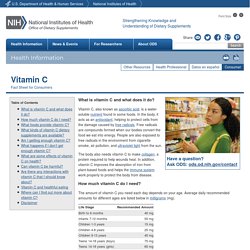
Vitamin C, also known as ascorbic acid, is a water-soluble nutrient found in some foods. In the body, it acts as an antioxidant, helping to protect cells from the damage caused by free radicals. Free radicals are compounds formed when our bodies convert the food we eat into energy. People are also exposed to free radicals in the environment from cigarette smoke, air pollution, and ultraviolet light from the sun. The body also needs vitamin C to make collagen, a protein required to help wounds heal. How much vitamin C do I need? The amount of vitamin C you need each day depends on your age. If you smoke, add 35 mg to the above values to calculate your total daily recommended amount. Vitamin K — Health Professional Fact Sheet. Introduction “Vitamin K,” the generic name for a family of compounds with a common chemical structure of 2-methyl-1,4-naphthoquinone, is a fat-soluble vitamin that is naturally present in some foods and is available as a dietary supplement [1].
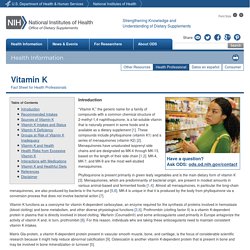
These compounds include phylloquinone (vitamin K1) and a series of menaquinones (vitamin K2) [2]. The Ultimate Guide to B Vitamins. The History and Discovery of Vitamins Through The Ages - What's Up, USANA? 5 of the Most Common Nutrient Deficiencies. A History of Vitamins: How They Were Discovered & Why We Need Them. History and Discovery of Vitamins. a000124. ויטמין. הגדרת הוויטמין היא בעייתית מעט משום שיש לה לא מעט מקרי גבול.
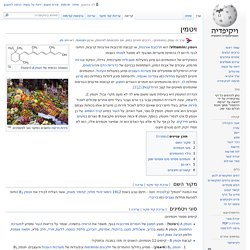
ויטמין C, לדוגמה, עונה להגדרת הוויטמין עבור בני אדם ועבור בעלי חיים אחרים שיכולים לאכול פירות. אולם, בעלי חיים רבים שאינם יכולים לאכול פירות כן מייצרים אותו בכוחות עצמם ועבורם הוא אינו ויטמין. ויטמין D נוצר, אצל האדם, על העור בסיוע קרני השמש. על כן ויטמין D אינו לגמרי וויטמין. בנוסף, ויטמין K וכמה ויטמינים מקבוצת B נוצרים במעיים בסיוע חיידקים. מקור השם[עריכת קוד מקור | עריכה] את המונח "ויטמין" (בלטינית: ויטה - חיים) טבע בשנת 1912 כימאי יהודי פולני, קזימיר פאנק, אשר הצליח לבודד את ויטמין B1 החיוני למניעת מחלות עצבים כמו בריברי. סוגי ויטמינים[עריכת קוד מקור | עריכה] קיימים מספר ויטמינים: גילוי הוויטמינים[עריכת קוד מקור | עריכה] בשנת 1928 זכה הכימאי הגרמני אדולף וינדאוס בפרס נובל לכימיה על עבודתו בתחום הסטרולים והקשר שלהם לוויטמינים.
ויטמינים מסיסי מים ומסיסי שמן[עריכת קוד מקור | עריכה] ערך מורחב – הרעלת ויטמינים. Fn1 ppt. vitamins and minerals.